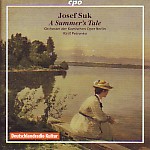Suk’s A Summer’s Tale (as it’s translated here) is one of the most masterful and beautiful of all large late-Romantic orchestral works. Mahler had planned on programming it before his untimely death, and no wonder. The final slow movement in particular remains one of the most haunting creations in the entire orchestral repertoire. It has been recorded memorably by Libor Pesek (twice) and Charles Mackerras, and the former’s performance with the Czech Philharmonic on Supraphon remains the version of choice. This newcomer, recorded live, also has its memorable moments, including a really exciting first movement and an aptly manic scherzo (“In the Power of Illusions”).
In the final analysis, though, the playing here just isn’t as accomplished as that of the Czech Philharmonic (for either Pesek or Mackerras), and there is a certain amount of performance noise that occasionally proves distracting despite fine engineering overall. Certainly conductor Kirill Petrenko deserves credit for his enterprise in choosing the work, not to mention his conviction as an interpreter of it. The Intermezzo, “Blind Musicians”, with its melancholy cantilena for two English horns supported by rich harp chords, is particularly memorable. So are the final pages, with their mesmerizing bell imitations on low notes of the piano, celesta, and muted brass.
Less appealing is the coupling–Liadov’s The Enchanted Lake in a static performance a full minute or two slower than most, and this in a work only lasting some seven minutes in all. All of the other recordings of A Summer’s Tale include other fine pieces by Suk, offering more musical substance as well as a better deal economically. So the Suk remains a very good performance that’s simply outclassed in small ways by the available competition. Collectors are spoiled for choice, which is good news for them, if not necessarily for the record companies.
































